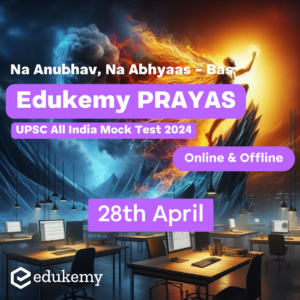
Embarking on the journey of UPSC preparation from the comfort of one’s home is a choice that holds both advantages and challenges. The decision to start UPSC preparation at home makes sense for numerous reasons. Firstly, it allows aspirants the flexibility to create a personalized study schedule that suits their individual pace and preferences. With the abundance of online resources, candidates can access a vast array of study materials, lectures, and mock tests, enabling a comprehensive and self-directed learning experience. Additionally, studying at home provides a conducive and familiar environment, reducing external distractions. However, it demands a high level of self-discipline and motivation as the absence of a structured classroom setting may lead to procrastination. The responsibility lies on the aspirant to cultivate a disciplined routine, stay focused, and seek guidance through online forums or coaching platforms. In conclusion, starting UPSC preparation at home can be a pragmatic approach for those who thrive in a self-driven and flexible learning environment, but it requires commitment and diligence to navigate the challenges effectively.
Not only freshers but students who have been preparing for consecutive 2-3 years also sit for this exam with the aim and determination of joining the civil service and for a prestigious position. Also for this exam, many aspirants try to start their preparation as soon as possible and sometimes at home without any help.
Most of the students feel dreadful and overwhelmed with the level of competition and vastness of the syllabus so the aspirants mostly try to opt for tuition classes and coaching institutes.
Even Delhi is a very famous place where aspirants from various states and parts of the country so to prepare for UPSC, especially just like Kota where students go to prepare for UG level exams like NEET and JEE.
Is starting my UPSC preparation at home a wise decision?
Well, this totally depends on the aspirant if they think that they are confident enough to handle this pressure plan and strategize everything by themselves then they can start the preparation at home by themselves and as we all know no matter how good a coaching institute is but self-study matters the most and if one is preparing all by themselves they could easily get the maximum time for self-study and this is the biggest pros of self-preparation.
9 tips that you must know before you start your IAS exam preparation at home.
#Health is wealth
Preparing yourself mentally is something an aspirant must consider at the very beginning because once you get into it, it will be very difficult, and if you are not truly mentally prepared and prepared for all the hardships that are coming along the way.
- One should not be in great mental health but physical health should also be considered.
- UPSC preparation is a long and tiring one and an aspirant cannot afford to lose a single week.
#Time tables, planning, schedules
Planning before time is a must, also when an aspirant is preparing by themselves it becomes more important.
Because when one is preparing by oneself, they needs to manage their studies and plan their schedule in such a way that there is minimum wastage of time and make the most out of it. Planning each day, with daily goals and weekly goals is advisable so that there is continuous progress and consistent effort.
#The ability to manage time comes into play!
Time management is very important as the aspirant who is preparing for the IAS exam themselves, have to manage everything on their own.
From preparing for mock tests to planning them, from starting their syllabus to making notes of everything they have to do themselves and for proper time management is necessary.
Without proper timing plans throughout the day, a student will lose precious time for preparation and a lot of procrastination will also happen.
#NCERT is the key
- NCERT is a very important part of the preparation, in the beginning, months of the preparation students must consider completing the NCERT books thoroughly.
#Online courses to the rescue!
- There is no harm in taking up an online course, online courses are generally very flexible and students can listen to lectures at their preferred time and place and can even download them for future reference.
#These kinds of courses also make it easy for students to keep their progress on track.
Get to know about the exam properly
UPSC exam has quite many rules and regulations which are generally discussed in coaching and if an aspirant has decided to be self-dependent then one should be properly updated about the whereabouts of the exam, the rules, and the regulations.
Many sites and online videos that are verified can also help with that.
Get to know about the syllabus
The board has properly provided the syllabus of the prelims and mains in a very descriptive manner and before starting the preparation collecting all about the syllabus and all the required materials which are important is the foremost step.
The optional subject should be selected properly
One should properly evaluate their strength and weaknesses and then choose their optional subject.
There are a few factors according to which one should choose their optional subject:
- Subjects related to a prior academic background can be a stronger decision than a new subject.
- Based on available books and sources
- With correct analysis of the previous year’s papers and difficulty levels.
Major problems faced by the students who are self-preparing at home for the IAS exam?
- There are times when students do not plan well and have less idea about how much they should grasp about a topic and this way sometimes students waste their priceless time with just some mere topics and are not able to complete the syllabus also.
Solution: spending time reading just the tip of the iceberg of a topic or reading the topic’s unnecessary details without smart work, both cases are dangerous.
Students should recognize and find out how much is important and necessary.
- Students tend to get demotivated after a certain point in time
Mostly during the middle of the preparation phase when there is a time for certain aspirants when neither they are doing great at mocks nor their syllabus is finished. Also at this very crucial point, many of them lose hope and get demotivated which results in a loss of time and confidence for the exam
Solution: students must keep in mind why in the first place they decided to choose this profession and what was the reason behind it. For surviving a long time in this tough journey it is necessary to have a rock-solid reason and motivation because this is not just an exam for a month.
IAS exam requires hard work and perseverance for the longest time along with consistent efforts.
- Evils of Getting Comfortable
Many aspirants try to prepare for the exam by staying at home, in the comfort of their family and a suitable environment but this situation does not always go in their favor, and sometimes this in fact goes the opposite as thought.
Aspirants become comfortable with their surroundings and without coaching there is not much competition either.
Solution: If an aspirant is not opting for coaching one should consider living in a hostel or a paying guest at least, if possible.
Sometimes the comfort of your home can make you lazy and this is very dangerous for the preparation, this was a lot of procrastination and delaying of work which results in incomplete goals and later depression.
- Getting unsocial and awkward.
Preparing alone at home does not mean that one should get introverted and remain aloof from any kind of social event or in fact stop socializing.
Solution: only after talking to different people, participating in discussions, and having a fair share of interest in all sorts of political, cultural, and social affairs one can gain perspective, which is very important in this IAS exam.
Also if your social skills are down the drain you might ruin your chances of scoring well in the interview round as well because the sole purpose of that round is to test how good your social, verbal, and speaking skills are.
Tips on making notes for the IAS exam at home.
- Give a detailed reading of the NCERT books first
- Highlight the important points while reading
- Make relevant notes according to the highlighted parts.
- If possible make flow charts and summaries for longer portions or longer big topics.
- Make it easy to revise short-form notes.
After you finish reading the relevant NCERT for the particular subjects, choose 1-2 good publication books for the subject and start preparing them.
- Do not go for ample books for a single subject
- Also one should keep in mind to not skip a topic after just touching the tip of the iceberg
- One topic should be read in the proper way because in-depth knowledge is required.
- Make relevant notes interconnecting the points from different books so that revising them is easy and takes less time.
Keep yourself updated and ready for the competition!
- This habit is considered to be a very common one in an Indian household for this exam, this holds a very important part.
- Newspaper not only contains political issues but also what is going on in the world, from Bollywood to sports newspaper contains everything.
- One should also not go through the daily esteemed like a storybook but also make notes out of it.
- Highlight the very prominent events and make notes so that you can revise them later.
- You can prepare files for different types of events, such as a file for a political event, a file for a social event, a file for a sports event, etc.
Practice is vital and crucial
- When one is preparing by themselves then the whole responsibility lies on the shoulder of the aspirant itself.
- Finding out the best online mocks or offline mocks is a vital task that should be done in the beginning only.
- Regularity should be maintained.
- Many times, students become lazy and keep on procrastinating and delaying tests for the future but this should not be done in any scenario
- Daily mocks and answers writing practice is a must without fail.
- Daily practice not only improves the writing style and manners but also helps to write it reader-friendly.
- One should also put in their own perspective and opinion in such a way that it is impactful but also doesn’t seem like a stubborn opinion.
- Also while preparing from home a student lacks a competitive environment and thus joining a great mock with lots of students will help to know where they actually stand.
Benefits of practicing and writing answers daily.
- At certain times doing the same thing might seem to be monotonous but this is equally important as finishing the syllabus.
- Especially there are times when you see no significant improvement but this is the time when you have to hold your rope and keep ongoing.
- Practicing mocks daily will create momentum and will also help in finishing the paper on time.
- The syllabus of the IAS exam is practically everything and one can not know or remember everything in a matter of few hours, in that case, calculative risks and guesses help, but for that one needs to practice a lot to gain that experience of doing it.
There are times when always joining coaching or taking out complete time for the preparation is not possible then students have to do it all by themselves.
Some students might start their preparation in their final year of graduation, some students might be doing a job, and among all these self-preparation is an important phase of preparation one should not be afraid of it and it is totally possible to crack UPSC on your own.
It just requires the correct amount of motivation and determination. Along with consistent efforts and goals.
Many students also fear the hours of labor they have to put in, for this exam and there is a vet famous question of how many hours they should study.
basically there is no correct amount of time one should study to crack UPSC but it totally depends on the aspirant and their strengths, to know more about the timings and planning you can also check out this article on the amount of time a aspirant should study to crack UPSC.
Frequently Asked Questions (FAQs)
Q: Is it feasible to prepare for UPSC exams at home?
Yes, it is entirely feasible to prepare for UPSC exams at home. Many successful candidates have opted for self-study and home preparation. However, it requires discipline, a well-structured study plan, and access to relevant study materials.
Q: What are the advantages of starting UPSC preparation at home?
Home preparation allows flexibility in study hours, personalized study plans, and the comfort of studying in a familiar environment. It also eliminates the need for relocating to coaching centers, saving time and resources.
Q: Are there any disadvantages to preparing for UPSC exams at home?
While home preparation offers flexibility, it may lack the structured environment provided by coaching centers. Additionally, self-discipline becomes crucial, and there may be challenges in accessing expert guidance and peer interaction compared to formal coaching setups.
Q: How can one create an effective study environment at home for UPSC preparation?
Designate a dedicated study space, adhere to a strict study schedule, eliminate distractions, and stay organized. Utilize online resources, join virtual study groups, and stay connected with UPSC aspirant communities to enhance learning and stay motivated.
Q: Are there specific resources available for home-based UPSC preparation?
Yes, there are numerous resources available for home-based UPSC preparation, including online study materials, UPSC exam websites, e-learning platforms, and online test series. Additionally, aspirants can refer to standard textbooks, newspapers, and magazines to stay updated on current affairs.
In case you still have your doubts, contact us on 9811333901.
For UPSC Prelims Resources, Click here
For Daily Updates and Study Material:
Join our Telegram Channel – Edukemy for IAS
- 1. Learn through Videos – here
- 2. Be Exam Ready by Practicing Daily MCQs – here
- 3. Daily Newsletter – Get all your Current Affairs Covered – here
- 4. Mains Answer Writing Practice – here


